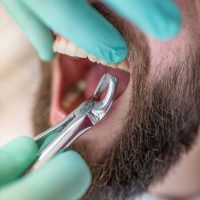What is Tooth Extraction?
“Tooth Extraction” refers to the dental procedures involved in removing a tooth, including wisdom teeth.
Am I a Good Candidate?
Determining if you are a good candidate for tooth extraction, including wisdom tooth removal, involves several factors. Here are some considerations to help you understand your candidacy:
- Dental Health: If you have severe tooth decay, advanced gum disease, or a tooth that is beyond repair, you may be a candidate for extraction. Wisdom teeth that cause pain, crowding, or are at risk of decay or infection may also need to be removed.
- Symptoms: Pain, swelling, or infection in the mouth can be indicators that you need a tooth or wisdom teeth extracted. Overcrowding or difficulty in maintaining oral hygiene due to misaligned teeth may also necessitate extraction.
- Age and Development: Young adults, typically between 17 and 25, are commonly evaluated for wisdom teeth extraction as the teeth become fully developed and the jaw stops growing.
- Overall Health: Your overall health status and medical history play a role in determining your eligibility for tooth extraction. Certain health conditions or medications may affect the healing process or the procedure itself.
- Consultation with a Dental Professional: A dentist or oral surgeon will evaluate your oral health, examine dental X-rays, and discuss your symptoms and concerns to determine if extraction is the best option.
It’s essential to consult with a dental professional who can provide a thorough examination and personalized recommendation based on your unique circumstances.
Benefits:
Here are some benefits of tooth and wisdom tooth extraction:
- Relief from Pain and Discomfort: Removing problematic teeth can alleviate pain, swelling, and other symptoms associated with tooth decay, infections, or impacted wisdom teeth.
- Preventing Further Dental Issues: Extracting a severely decayed or infected tooth can prevent the spread of infection to surrounding teeth and tissues. Removing wisdom teeth can prevent crowding and potential damage to adjacent teeth.
- Improved Oral Hygiene: Extracting overcrowded teeth or those causing misalignment makes it easier to maintain proper oral hygiene, reducing the risk of future cavities and gum disease.
- Enhanced Functionality: Removing damaged or decayed teeth can restore normal chewing and biting function, improving overall oral health and quality of life.
- Prevention of Future Complications: Extracting wisdom teeth can prevent cysts, tumors, or damage to the jawbone, which can occur if impacted wisdom teeth are left untreated.
- Cost-Effective: In some cases, extraction can be a more cost-effective solution than multiple dental procedures to try to save a tooth that may ultimately need to be removed anyway.
- Aesthetics: Removing teeth that are visibly damaged, decayed, or causing misalignment can improve the overall appearance of your smile.
- Immediate Implant Placement: In certain cases, extraction can be immediately followed by implant placement, minimizing the time you have to spend without a tooth and maintaining jawbone integrity.
- Quicker Recovery: Compared to more invasive dental procedures, tooth extraction generally offers a quicker recovery, allowing patients to resume normal activities sooner.
Discussing these potential benefits with a dental professional can help you make an informed decision about tooth extraction.
More Details:
Our doctors at the Skin Experts Polyclinic will do everything to help you preserve your healthy and natural teeth for as long as possible. However, if you do need to get a tooth removed, Prof. Nada Naaman is an expert in tooth extractions. They will ensure a comfortable procedure and, in some cases, will recommend immediate implant placement.
Tooth extraction may be necessary if the tooth is suffering from severe decay, if the gum disease is advanced and the tooth is not salvageable, if overcrowding is affecting other teeth, and if the tooth is broken due to trauma.
Wisdom teeth extraction is a commonly performed procedure. Our doctors will help you decide if your wisdom teeth should be extracted or not. Sometimes a wait-and-see approach is suitable. Other times, removing wisdom teeth is necessary to prevent crowding or decay.
